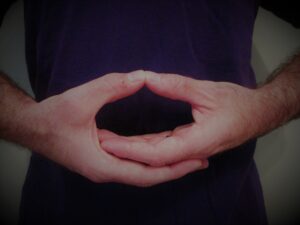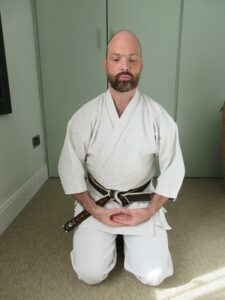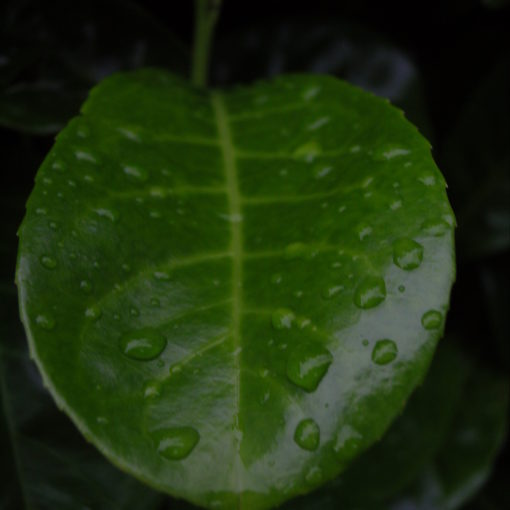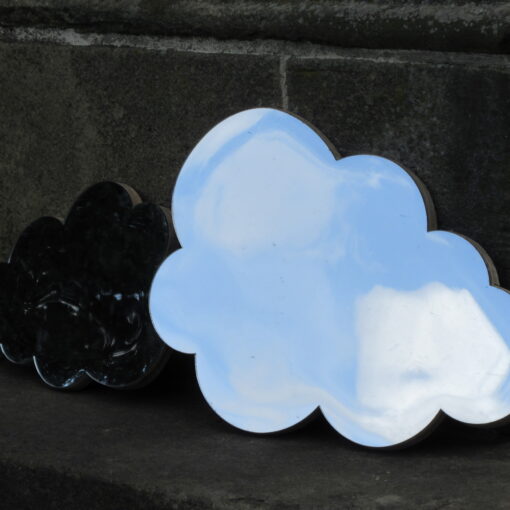Kris kneeling in mokuso
Over the past few years ‘mindfulness’ has become a bit of a buzzword. It is often misconceived as being synonymous with sitting meditation, but there is more to it than that. This article explores how mindfulness practice is ingrained in karate training, both as a practice and as an approach. I also give some suggestions as to how you can improve your performance in the dojo by being more mindful. Before examining how mindfulness is applied in karate, it’s important to be clear about what mindfulness is: non-judgemental awareness of the present moment.
The dojo is a good place to be present. Indeed, karate practice encourages us to be in the moment. It’s hard to think about a work meeting when someone is trying to punch you – that tends to focus your attention on the here and now. Indeed, my first experience of mindfulness practice was in the karate dojo practising mokuso (‘silent thinking’). Starting training with a bow and mokuso, is a great way to put the outside world to one side for a while and focus on being here, now, on the dojo floor.

If you haven’t tried it, you can do mokuso during a kneeling bow at the start and end of a session. After kneeling in seiza, but before bowing, the instructor says ‘mokuso’ and you can either close or lower your eyes. With your hands on your thighs or with the left hand cupped in the right (see photo) you can focus on your breath and observe how you are without self-criticism. There’s no need to change your breathing or do anything special, just be aware of your thoughts, sensations and feelings in the moment without self-criticism until the instructor says ‘mokuso yame’ (‘end silent refection’). It’s a mindful moment at the start or end of the lesson, a mental warm-up or cool-down, similar to stretching for your body, but for your mind.
In terms of physical training, being in the moment with mindful self-awareness is a precondition for mushin, or no-mindedness. Mushin is a Zen concept used in martial arts which is similar to the idea of ‘being in the zone’ in sports psychology. Mushin defines a state of unreflective awareness. It is a state of self-aware activity in which intention and action are integrated without conscious thinking. Awareness is the key, as it’s not a sense of mindless automaticity, but of mind and body working together in the moment. It’s like the difference between driving a car on ‘automatic pilot’ versus paying attention to your surroundings while driving down the road.
Mindfulness is not all about sitting meditation, it is perfectly possible to do mindful movement – to have a sense of self-awareness in your technique as you kick, punch or block, as well as an awareness of your sparring partner, without consciously reflecting on what you are doing in the moment. Have you ever started a kata only to get to the end before you know it without thinking but performing each move with relaxation, focus, and intensity? If so, you know what mushin feels like.
So, while ‘mindfulness’ may seem like a current fad, the Zen-influenced philosophy and practice of karate training is in fact infused with mindfulness. I’ll end this short article with two practical suggestions, which you may find helpful:
- Include a period of mokuso at the start and end of your training, even just for 20 seconds. It will help bring you to the present and prepare you mentally for training or allow you to gather your thoughts after it.
- Try to be present when you perform your techniques in kata, kihon, or kumite. It’s okay to get distracted, or nervous, but if you focus on what you are doing in the moment with non-judgemental self-awareness, rather than on the outcome, you’ll be able to optimise your performance.
This article was published by MartialArtsOnline magazine at: https://www.martialarts-online.co.uk/single-post/mindfulness-in-karate-training, although the website is no longer current. An extended version of this article has now also been published in Shotokan Karate Magazine (issue 147, March 2021).




